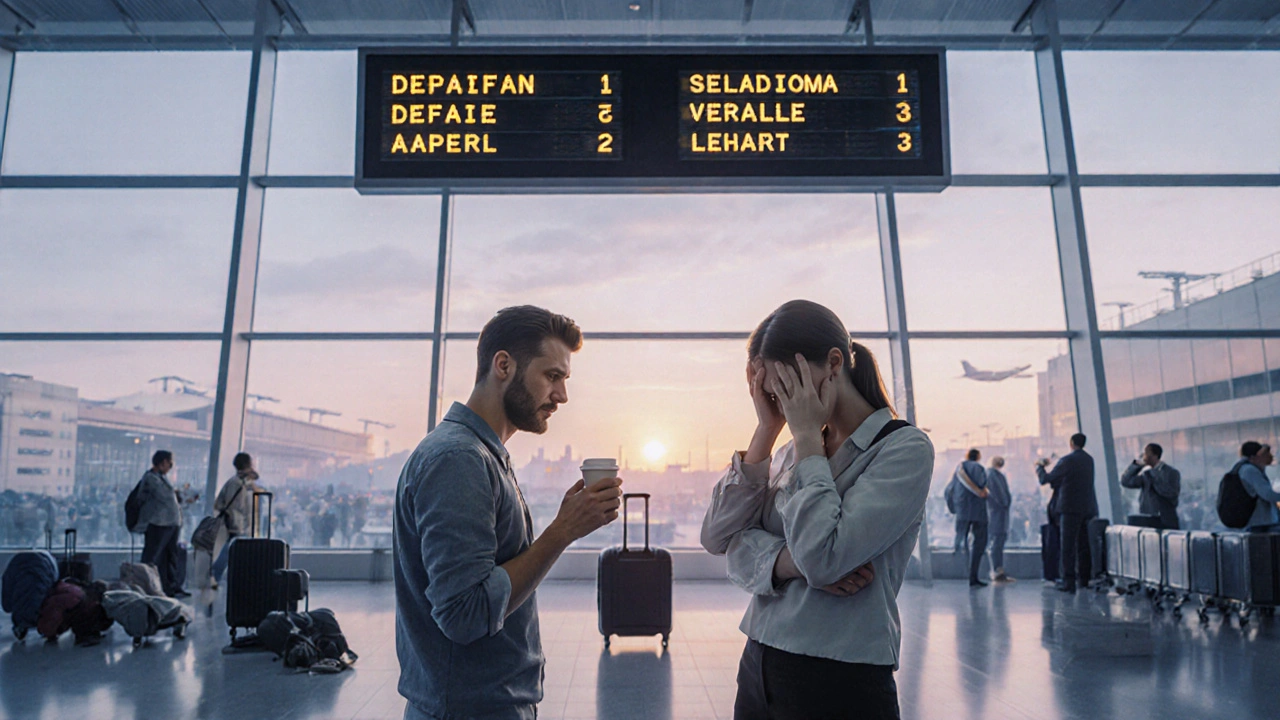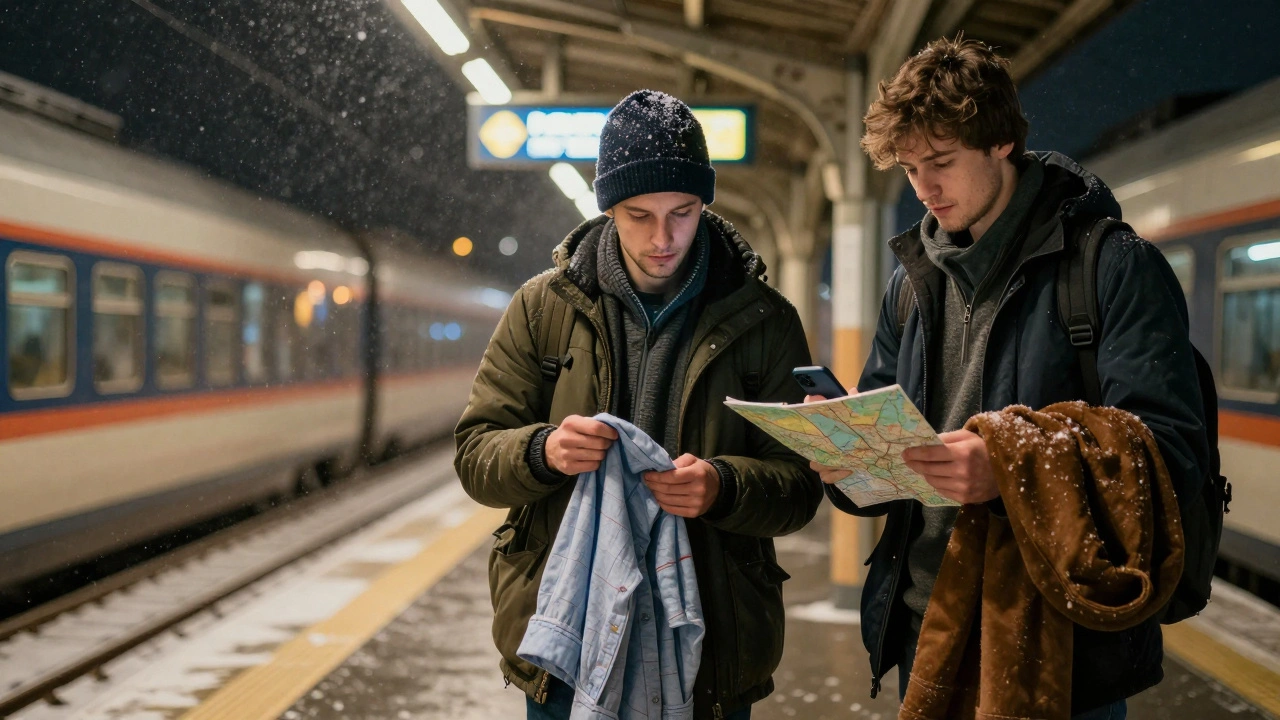Travel Companion Compatibility: Signs You're a Good Match

Traveling with someone can turn into the best trip of your life-or the most stressful one. It’s not about how much you like each other. It’s about whether your travel companion compatibility lines up. You might love your friend, partner, or sibling in everyday life, but put them in a foreign airport at 6 a.m. with a delayed flight, and everything changes. The truth? Compatibility isn’t about shared interests. It’s about how you handle stress, space, money, and schedules together.
Do You Handle Stress the Same Way?
One person panics when the train is late. The other calmly checks the next departure and buys a coffee. That’s not a personality clash. That’s a compatibility red flag.
Travel exposes how people react under pressure. If one person needs rigid plans and the other thrives on spontaneity, small delays become major conflicts. A 2023 study by the Travel Behavior Institute found that 68% of travel arguments between companions stemmed from mismatched stress responses-not the destination or budget.
Look for this: When something goes wrong, does your companion take charge calmly? Or do they blame others, raise their voice, or shut down? You don’t need to be identical. But you do need to trust each other’s reactions. If you’re the planner and they’re the free-spirit, agree on a middle ground: book accommodations in advance, but leave one day wide open.
Are Your Budgets Aligned?
Money isn’t just about how much you spend. It’s about what you’re willing to spend it on.
One person thinks a $200 hotel is a splurge. The other sees it as a baseline. One wants to eat street food every night. The other insists on a nice dinner to "make the trip memorable." These aren’t just preferences-they’re values in action.
Before you book anything, sit down and answer these questions: What’s your daily spending limit? What’s your non-negotiable? (Is it clean sheets? A hot breakfast? A private bathroom?) What’s your dealbreaker? (No hostels. No public transport after dark.) Write it down. Share it. If your numbers don’t overlap, you’ll end up resenting each other-or worse, hiding purchases.
Pro tip: Use a shared budgeting app like Tripcoin or Splitwise. Track everything in real time. No surprises. No "I didn’t know you were spending that much."
Do You Sleep and Move at the Same Pace?
Early riser or night owl? Do you want to hit the museum at 8 a.m. or nap until noon? This isn’t about laziness. It’s about biological rhythm.
Imagine this: You wake up at 6 a.m., ready to explore. Your companion is still asleep. You wait an hour. Then two. By the time they’re up, the lines are long, the tour is full, and the mood is ruined. Or worse-you’re the one dragging yourself out of bed while they’re already halfway through the city.
A 2024 survey by WanderLust Research found that 54% of travelers said mismatched energy levels were the #1 reason they cut trips short. You can’t change your circadian rhythm. But you can plan around it.
If you’re a morning person and they’re not, split the day. You go out early. They sleep in. Meet for lunch. Then they take the evening shift. No guilt. No pressure. Just structure that respects both of you.

Do You Respect Personal Space?
Travel forces you into tight spaces. A 10-square-meter hotel room. A packed bus. A single bed. If you’re the kind of person who needs quiet time, solitude, or physical distance, you’ll burn out fast if your companion expects constant togetherness.
Some people feel disconnected if they’re not constantly chatting, taking selfies, or holding hands. Others need to wander alone for an hour to recharge. Neither is wrong. But ignoring this leads to resentment.
Ask yourself: Do you need alone time during the day? Can your companion handle it without taking it personally? Can you both say "I need 90 minutes to myself" without guilt?
Good travel companions don’t need to be glued together. They know when to give space-and when to come back together. A simple rule: Agree on one solo hour per day. No questions asked. No explanations needed.
Are Your Communication Styles Compatible?
Do you speak up when something bothers you? Or do you stay silent until you explode?
One person says, "This hotel is too noisy." The other says, "We’ll get used to it." One says, "Let’s change plans." The other says, "We already paid for this."
Travel is full of small decisions: Where to eat? Which museum to skip? When to leave? If one person avoids conflict and the other demands control, you’re setting up a silent war.
Healthy communication means: You notice something, you say it calmly, and you listen to the response. No blaming. No sarcasm. No "I told you so."
Try this: Before you leave, agree on a "travel check-in" ritual. Every night, spend five minutes asking: "What went well? What didn’t? What can we change tomorrow?" Keep it light. Keep it honest.

Do You Share the Same Travel Goals?
Are you traveling to relax? To explore? To take photos? To eat everything? To prove you’ve been everywhere?
One person wants to lie on a beach for a week. The other wants to hike five mountains in three days. One wants to meet locals. The other wants to Instagram famous landmarks. These aren’t just different itineraries-they’re different purposes.
If your goals don’t align, you’ll end up feeling like you’re on separate trips. You’ll be bored. They’ll be frustrated. You’ll both feel like you didn’t get what you came for.
Before booking, have this conversation: "What do you hope to feel when this trip ends?" Not "What do you want to see?" Feelings matter more than sights. Do you want to feel calm? Inspired? Connected? Adventurous? If your answers are worlds apart, you might need to travel separately-or pick a destination that offers both.
What If You’re Not a Perfect Match?
Here’s the truth: No one is a perfect travel match. Even the best pairs have moments of frustration.
But compatibility isn’t about being identical. It’s about being flexible, respectful, and willing to adjust. You don’t need to agree on everything. You just need to know how to disagree without damaging the trip-or the relationship.
If you’ve checked the boxes above-stress response, budget, sleep schedule, space, communication, goals-and you still feel uneasy? That’s your answer. Don’t force it. Traveling with someone who drains you isn’t worth the memories.
Some of the best trips happen with strangers you meet along the way. Others happen with friends you’ve never traveled with before. The right match isn’t the one you’ve known the longest. It’s the one who makes you feel safe, heard, and free-even when things go wrong.
Quick Checklist: Are You a Good Travel Match?
- ✅ You both agree on a daily budget range
- ✅ You can say "I need alone time" without guilt
- ✅ You handle delays or changes calmly
- ✅ You communicate concerns before they turn into arguments
- ✅ You respect different energy levels and sleep patterns
- ✅ You both want to feel something similar by the end of the trip
If you checked 5 or more of these, you’re likely a great match. If you checked 3 or fewer, consider a trial run-a short weekend trip-before booking a two-week vacation.
Can you travel with someone who has completely different travel habits?
Yes, but only if both people are willing to compromise and respect boundaries. For example, one person can plan the itinerary while the other picks the meals. Or you can split time: half the day together, half apart. The key is structure, not sameness.
What’s the biggest mistake people make when choosing a travel companion?
Assuming that because they’re a great friend or partner in daily life, they’ll be great on the road. Travel changes behavior. Stress, fatigue, and unfamiliar environments reveal habits you never noticed. Always test compatibility on a short trip first.
How do you handle a travel companion who spends too much money?
Set clear limits before you go. Use a shared budgeting app to track spending. If someone goes over, agree on a fair way to split the difference-like taking turns paying for meals next time. Avoid accusations. Focus on solutions, not blame.
Is it okay to travel with someone who’s more introverted than you?
Absolutely-if you respect their need for quiet. Introverts recharge alone. That doesn’t mean they don’t enjoy the trip. Give them space. Don’t pressure them to be social. They’ll appreciate you more for it.
What if my travel companion is always late?
Set a rule: Leave 15 minutes before the scheduled time. If they’re late, you go without them. No waiting. No drama. If they’re consistently late, it’s a sign they don’t value your time. That’s not a travel issue-it’s a relationship issue.
If you’re planning your next trip, take this checklist with you. Talk to your companion before you book. Fix the small things now, so you don’t regret them later. The best trips aren’t the ones with the most photos. They’re the ones where you come home feeling closer-not drained.


Johanna Iñiguez
November 1, 2025 AT 05:13You say ‘chill observer’ but your entire comment is riddled with grammatical errors, inconsistent capitalization, and a lack of proper punctuation. ‘i was just thinking’ should be capitalized. ‘i didnt’ is missing an apostrophe. ‘pastel de nata’ is not a proper noun and doesn’t need italics unless you’re citing a title. Also, you refer to ‘she’ without ever naming her-this is lazy writing. The article was well-structured, precise, and insightful. Your comment is a mess. And yet somehow, you’re the one who got the upgrade? Coincidence?
Ankit Chamaria
November 2, 2025 AT 03:21Man, this hit different. I traveled with my cousin from Mumbai to Kyoto last year-he’s a 6 a.m. temple-runner, I’m a 1 p.m.-wake-up-then-find-a-noodle-shop kind of guy. We did the split-day thing. He went to Fushimi Inari before sunrise. I slept. We met for ramen at noon. He took photos. I ate. Then he napped while I wandered Gion alone. No drama. No resentment. Just… rhythm. And honestly? That’s the secret. Not matching. Not changing. Just letting the other person be who they are. Also, shared budgeting apps? Yes. But don’t use Splitwise for food. Just pay for what you eat. Trust me, the math gets messy when you’re trying to split 1200 yen for three bowls of udon. Just say ‘I got this’ and move on. The trip’s not about who owes who 80 yen.
Travis Reeser
November 4, 2025 AT 00:24I think the real issue isn’t compatibility-it’s expectation. We assume if someone is kind in daily life, they’ll be kind on the road. But travel strips away the safety nets. No home comforts. No familiar routines. Suddenly, you’re in a foreign country with someone who thinks ‘budget’ means ‘whatever I feel like spending today.’ And you’re the one who booked the hostel because you read the reviews. It’s not about being controlling. It’s about being the responsible one. And that’s exhausting. I used to be the planner. Now I just say ‘you pick the hotel, I’ll pick the snacks.’ It’s not ideal. But it’s quieter. And sometimes, quiet is the win.
mahendra kushwaha
November 4, 2025 AT 10:28Respected author, your insights are profound and reflect deep cultural understanding. In Indian tradition, the concept of ‘sahacharya’-companionship on a journey-is not merely logistical but spiritual. The ancient epics speak of travelers who endured hardship not because they were alike, but because they respected differences. To force uniformity is to deny the essence of dharma. I have traveled with colleagues who woke at 4 a.m. and others who slept until noon; we did not compromise. We honored. One day, I rose early to visit a temple. They rested. We met at sunset, shared chai, and spoke of what we saw. No app needed. No budget tracked. Only presence. Perhaps modern tools help, but the soul of travel remains in silence, in space, in mutual reverence.
jasper watervoort
November 5, 2025 AT 07:04my sister and i went to mexico and she wanted to go to every ruin and i just wanted to sit on the beach and read. we did both. she did ruins in the morning. i did beach in the afternoon. we met for tacos. no big deal. she didnt get mad when i didnt take pics. i didnt get mad when she talked to strangers. we just did our thing. and it was fine. the best part was the tacos.
desiree marin parraga
November 6, 2025 AT 12:27OH MY GOD. I JUST REALIZED WHY MY LAST TRIP WITH MY BOYFRIEND WAS A NIGHTMARE. HE THOUGHT ‘SLEEPING IN’ MEANT 9 A.M. AND I THOUGHT IT MEANT 1 P.M. HE WAS SITTING ON THE BED STARING AT ME LIKE I WAS A MONSTER BECAUSE I WASN’T UP FOR THE ‘MORNING TOUR.’ I DIDN’T EVEN KNOW WE WERE ON A SCHEDULE. HE DIDN’T SAY ANYTHING UNTIL WE WERE LATE AND THEN HE JUST STORMED OFF AND LEFT ME AT THE MUSEUM. I HAD TO CALL A UBER JUST TO GET BACK TO THE HOTEL. AND THEN HE ACTED LIKE IT WAS MY FAULT BECAUSE I ‘DIDN’T RESPECT HIS TIME.’ I DIDN’T EVEN KNOW WE HAD A TIME. I THOUGHT WE WERE JUST ‘GOING TO THE MUSEUM.’ THIS ARTICLE IS A REVELATION. I’M DELETING THE APP. I’M BREAKING UP WITH HIM. I’M GOING TO ICELAND ALONE. I NEED A NAP.
Angie Hansen
November 8, 2025 AT 09:34Did you notice how every single ‘solution’ in this article assumes you’re traveling with someone who’s even remotely trustworthy? What if your ‘companion’ is secretly draining your credit card? What if they’re lying about their budget? What if they’re using your passport to book flights you didn’t authorize? This whole thing reads like a cozy podcast for people who still believe in human decency. I once traveled with someone who ‘forgot’ to tell me they’d booked a hotel with no heat, no hot water, and a bed covered in mold. They said it was ‘an experience.’ I filed a police report. Don’t trust anyone. Not even your best friend. Not even your partner. Travel is a surveillance state with bad Wi-Fi.
Dawn Dougherty
November 9, 2025 AT 02:38Actually, I think the whole article is backwards. The best travel companion is the one who’s completely different from you. That’s how you grow. I’m a control freak who plans every minute. My ex was a chaotic free spirit who’d show up to the airport with no shoes. We fought constantly. But after 3 weeks, I learned to breathe. And he learned to carry a wallet. We didn’t become the same. We became better. Now I’m with someone who’s exactly like me. And it’s boring. The magic isn’t in matching. It’s in surviving the mismatch. So if you’re reading this and you’re terrified of your partner’s ‘unstructured’ vibe? Good. That’s the point.